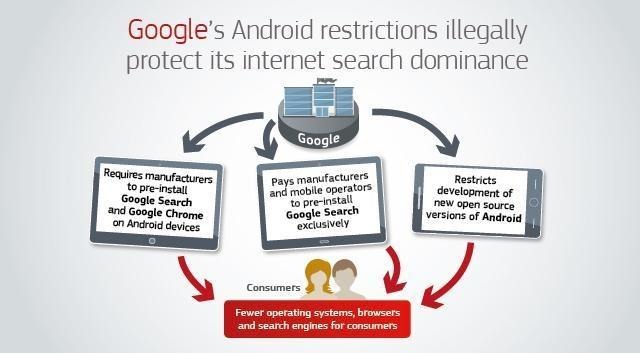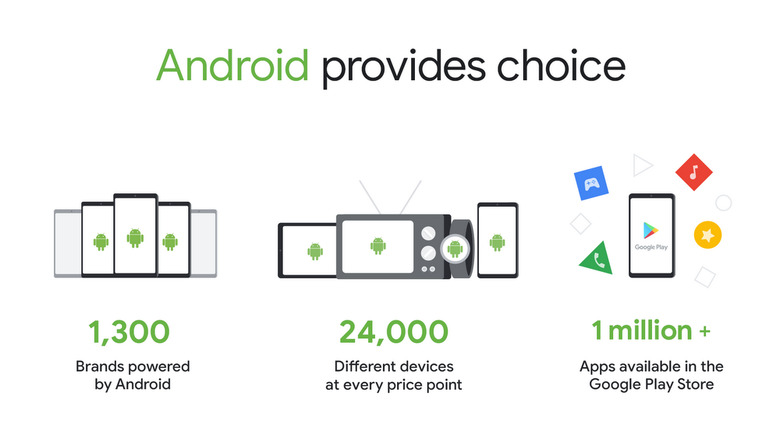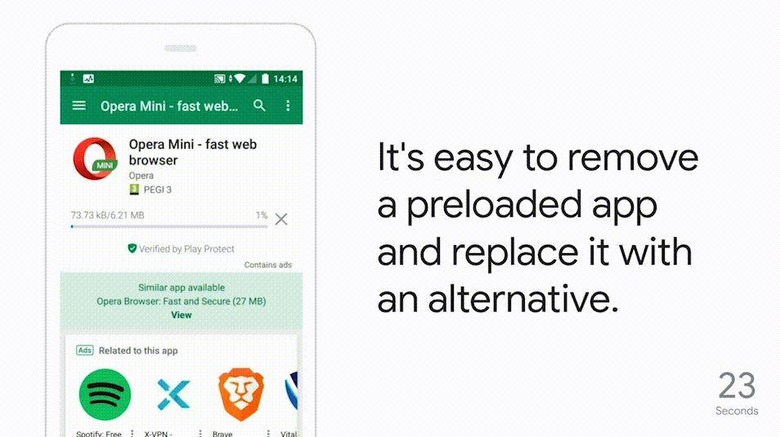EU Slaps Google With $5 Billion Fine, Says Android Violated Antitrust Laws
Google has drawn the ire of the European Union once more, earning itself a massive €4,342,865,000 fine ($5.05 billion) for what the EU views as antitrust violations. Today's fines center around Google Search and Android – more specifically, how Google has used Android as a "vehicle to cement the dominance of its search engine" as internet traffic shifts from desktop to mobile. Google now has 90 days to bring its illegal conduct to an end, otherwise it faces additional fines that will add up quickly.
The European Commission outlined the three ways Google has used Android to maintain its dominance in the world of search in a lengthy statement today. Google, the commission complains, offers its first-party Android apps to device manufacturers in a bundle. This bundle includes the Google Play Store, which is considered by many manufacturers to be a must-have app, since users expect to see it on their devices and don't really have a way to download it if it isn't present.
In order to put the Google Play Store on their devices, though, those manufacturers also have to include the Google Search app and Google Chrome, which of course uses Google Search by default. Since manufacturers have to pre-install the entire bundle, they aren't able to refuse Chrome or Search while keeping the Google Play Store.

The Commission says that these bundles do two things: they create a "status quo bias" where Android users simply use the apps that come installed on their devices without ever trying to seek out competing services, and they diminish the incentive for manufacturers to pre-install competing apps. This, in turn, makes it harder for competitors to gain a foothold in the mobile space since Android is by far the most popular mobile OS in terms of market share, and it's something that the Commission views as anti-competitive behavior.
The second complaint the Commission makes concerns Google's tendency to pay some large device manufacturers and mobile network operators to exclusively install Google Search across their entire Android lineup. Those payments, the Commission found, block Google's competitors from making similar pre-install deals of their own, simply because they can't afford to match the compensation packages Google offers:
The Commission's investigation showed that a rival search engine would have been unable to compensate a device manufacturer or mobile network operator for the loss of the revenue share payments from Google and still make profits. That is because, even if the rival search engine was pre-installed on only some devices, they would have to compensate the device manufacturer or mobile network operator for a loss of revenue share from Google across all devices.
For what it may be worth, the Commission notes that Google gradually began lifting this requirement in 2013, after the agency had started looking into the issue. The Commission says that this particular practice "effectively ceased" in 2014, though it does also note that Google's conduct between 2011 and 2014 was found to be illegal.
Finally, the Commission takes issue with Google's insistence that device manufacturers avoid running custom versions of Android – referred to as "Android forks" – on their devices if they want access to the company's proprietary Android apps like the Play Store. This not only restricts the development of new open source Android projects (which has long been one of the main selling points of the OS), but it also prevents competitors from introducing and pre-installing competing services on custom Android builds.

Specifically, the Commission notes that these rules "prevented a number of large manufacturers" from selling devices running Amazon's custom Fire OS, which is build on Android but centered around Amazon's apps instead of Google's. By making these demands, the Commission says that "Google has also closed off an important channel for competitors to introduce apps and services, in particular general search services, which could be pre-installed on Android forks."
Google, of course, has already replied to the Commission's complaints in a new Keyword blog post penned by CEO Sundar Pichai and titled "Android has created more choice, not less." Pichai points out that Android is now used by 1,300 different brands across 24,000 devices that are available at all price points. He also argues that the Commission missed the fact that Android competes with iOS, though the Commission did note that it considers Android to be in a different market from iOS because Apple doesn't license its operating system for use on third-party devices.

In regards to the restrictions Google places on Android manufacturers, Pichai says these are "simple rules that ensure technical compatibility" and, in fact, give all Android devices the ability to run the same applications. He says that without these rules concerning "baseline compatibility," fragmentation would become a major issue within the Android ecosystem.
Pichai also points out that if end-users want to use other apps aside from what comes pre-installed on their phones, removing or disabling those apps is an easy process. This doesn't really debunk the Commission's claim of status quo bias in Android users, though Pichai does use Opera Mini as an example of Android users choosing something other than Chrome, noting that it has over 100 million downloads on the Google Play Store.

He also reassures that manufacturers are not obliged to agree to Google's compatibility rules, nor are they forbidden from using custom versions of Android or installing competing apps alongside Google's suite. "Phone makers don't have to include our services; and they're also free to pre-install competing apps alongside ours," Pichai writes. "This means that we earn revenue only if our apps are installed, and if people choose to use our apps instead of the rival apps."
Ultimately, Pichai argues that's today's ruling by the European Commission "will upset the careful balance that we have struck with Android, and that it sends a troubling signal in favor of proprietary systems over open platforms."
The Commission says that Google now has 90 days to "bring its illegal conduct to an end in an effective manner," which means at a minimum addressing the complaints put forward in today's ruling. If it doesn't, it could be charged non-compliance payments of 5% of the "average daily worldwide turnover of Alphabet." Pichai, for his part, says that Google will appeal the Commission's decision, so we'll have to see how things shake out from here. Stay tuned.
